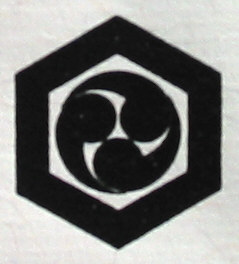

JAPANESE PRINTS
A MILLION QUESTIONS
TWO MILLION MYSTERIES
Ukiyo-e Prints浮世絵版画 |
|
formerly Port Townsend, Washington now Kansas City, Missouri |
|
UTAGAWA KUNISADA |
|
歌川国貞 |
|
1786-1865 |
|
Series: "Seven Contemporary Beauties as Komachi" |
|
當世美人七小町 "Tōsei bijin... Nana Komachi" |
|
Subject: Amagoi Komachi (i.e., rain-prayer Komachi) |
|
雨乞小町 |
|
Publisher: Kawaguchiya Uhei |
|
川口屋卯兵 |
|
Date: Ca. 1821-22 |
|
Signed: Gototei Kunisada ga |
|
署名: 五渡亭国貞画 |
|
Size: 15 3/16" 10 1/4" |
|
Illustrated on-line: There are other copies of this print in the collection of the Hagi Uragami Museum and the Boston Museum of Fine Arts. |
|
ORIGINALLY $1,400.00 NOW ON SALE FOR $1,000.00 NO LONGER AVAILABLE! |
|
|
|
|
|
|
|
|
|
|
|
|
Above is an example of a Toyokuni I print from his series Modern Girls as the Seven Komachi. Toyokuni was Kunisada's teacher. Intellect as well as style must have rubbed off.
Click on the picture above to go to the home page of the Lyon Collection. Then do a search on "Komachi" and then click on the image that comes up. |
|
|
|
|
|
|
|
Allen Hockley has written: "Since classical poetry from the Heian period was often collected and presented in numerical/thematic groupings, it came ready-made as a potential framing device. Examples include the Six Immortal Poets (rokkasen), the Six Jewel Rivers (mu tamagawa) and the Seven Episodes in the Life of Ono no Komachi (nana Komachi). Ukiyo-e producers used mitate to link the poets, the poems, or the sentiments they expressed with images of contemporary females." |
|
|
|
|
|
|
|
|
|
|
Hako-makura Box pillow 箱枕 |
|
|
|
|
|
|
|
|
||||
|
|
||||
|
|
||||
|
Publisher: Kawaguchiya Uhei |
|
|||
|
|
|
|||
|
|
View of the backside of the print seen above. |
|||
|
|
|
|||
|
Kiwame seal used between ca. 1790 and 1842. |
| Ono の Komachi |
| 小野小町 |
|
the poem |
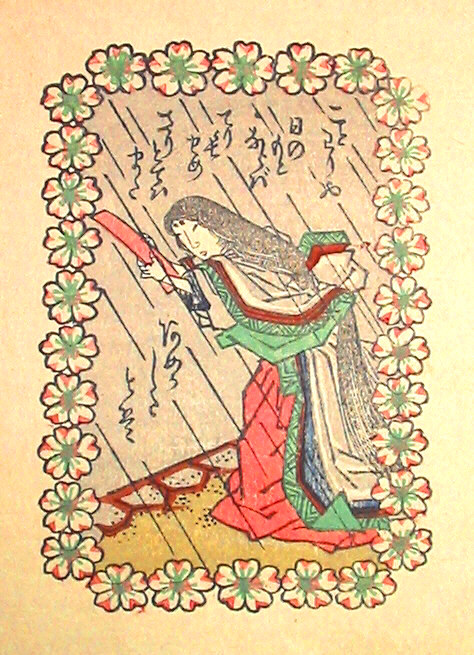 |
| ことわりや |
| Kotowari ya |
| 日の本ならば |
| hi no moto naraba |
| 照りもせめ |
| teri mo sen |
| さりとてはまた |
| saritote wa mata |
| あめが下とは |
| ame ga shita to wa |
|
|
|
Though it is true that
Japan
(translation by David Waterhouse) |
|
|
|
Sebastian Izzard notes that this poem attributed to the 9th century poet Ono no Komachi is an expression of the power of her poetry. She has written that the sun-beaten land is also that same land where rain must fall. Komachi's poem is credited with ending a long drought. Izzard also points out her popularity in ukiyo-e and illustrates this with a different print by Kunisada from ca. 1818-20 called "A Parody of the 'Invoking the Rain' Episode." |
|
THIS IS OLD HAT TO THOSE IN THE KNOW. |
||
|
|
||
|
Anyone who has had a fair amount of experience with Japanese prints knows that one of the ways prints can be identified as coming from a particular series is the title cartouche or possibly by the use of other repetitious motifs. This is nothing new to the majority of collectors, but for those of you who would consider yourselves novices this can be quite a revelation. Below are four small details of the insets which can be found on another print from this series. It speaks for itself. |
||
|
|
||
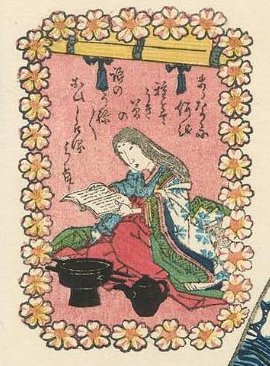 |
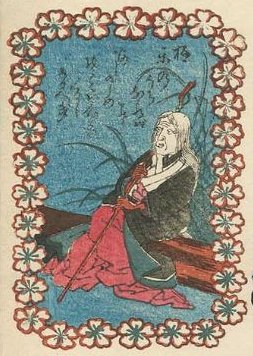 |
|
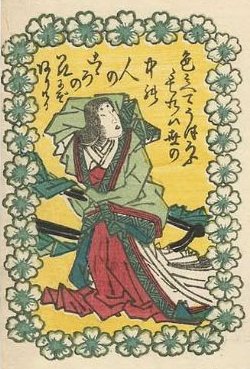 |
||
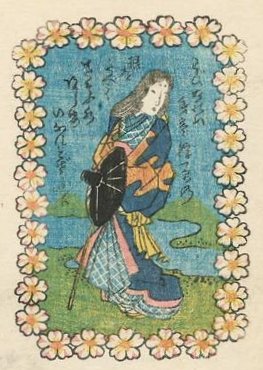 |
 |
|
|
|